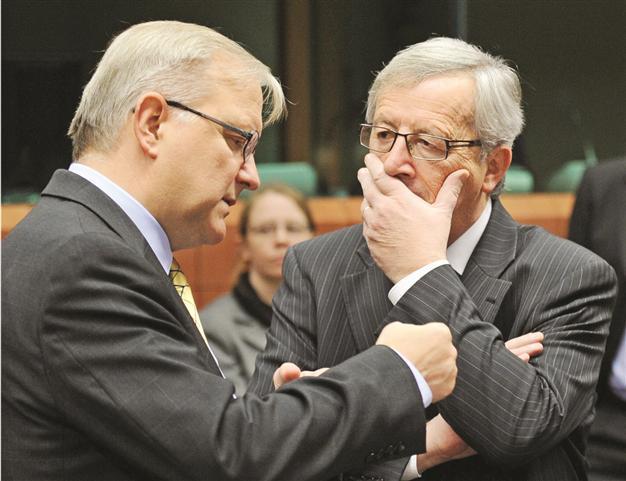Greece dismayed by lack of deal to release
ATHENS - The Associated Press

AFP Photo
Greece reacted with dismay yesterday to a failure by European finance ministers to agree to release up to 44 billion euros ($56 billion) of rescue loans it vitally needs, with the prime minister warning that the stakes are higher than his debt-ridden country’s future.
After 12 hours of debate into the early hours of yesterday, finance ministers from the 17 European Union countries that use the euro, together with the International Monetary Fund (IMF) and European Central Bank, again failed to reach a deal on Greece’s financing. The impasse follows another fruitless meeting last week and highlights the depth of divisions among European governments over how to handle the country’s huge debt problem without reaching deeper into the pockets of their own taxpayers.
“Greece has done what it had to and what it had committed to doing,” Prime Minister Antonis Samaras said in a statement. “Our partners, along with the IMF, also must do what they have undertaken.”
German Chancellor Angela Merkel said yesterday that a deal could still be clinched at a meeting of finance ministers on Nov. 26 but said Europe’s problems could not be solved overnight.
“There is a chance -- we don’t know -- but there is a chance that there will be a solution on Monday,” Merkel told lawmakers in the Bundestag lower house of parliament.
But Greece is already living on borrowed time. Faced with 5 billion euros in maturing treasury bills that it couldn’t pay last week, Athens issued more short-term debt to cover the gap and tide it over until it can receive its bailout funds. But most of that was in the form of four-week treasury bills, meaning the country will face the same situation next month - when it has more than 7 billion euros in redemptions - unless the loans come through. “It is not just the future of our country, but the stability of the entire eurozone that depends on the successful completion of this effort in the coming days,” Samaras said.
“Whatever technical difficulties (there might be) in finding a technical solution, do not excuse any ... delay,” he said.
Rescue loansGreece has been relying on rescue loans from other eurozone countries and the IMF since May 2010, after a massive budget gap and spiraling national debt left investors too wary of buying its bonds on the international market. In return, the country has had to submit its economy to scrutiny from the so- called troika of the IMF, ECB and European Commission. It has also had to impose several rounds of austerity measures, included repeated salary and pension cuts and increased taxes. The belt-tightening has left Greece mired in a deep recession expected to head into a sixth year. One in four Greek workers are now unemployed, and tens of thousands of small businesses have shut down. The country’s uneasy three-party coalition government recently passed another round of spending cuts through Parliament, a requirement for it to be given the long-delayed next installment of its rescue loans, a 31.5 billion euros batch.
The government also hoped to see outstanding funds from previous loan installments, and a batch originally earmarked for December, bringing the total expected to 44.6 billion euros.
The ministers are to tackle the issue again next week, which forced Samaras to cancel a planned trip to Qatar. Samaras was travelling to Brussels later yesterday for an EU summit meeting. Greek stocks fell in response to the delay, with the general share index down 0.8 percent in midday trading.
